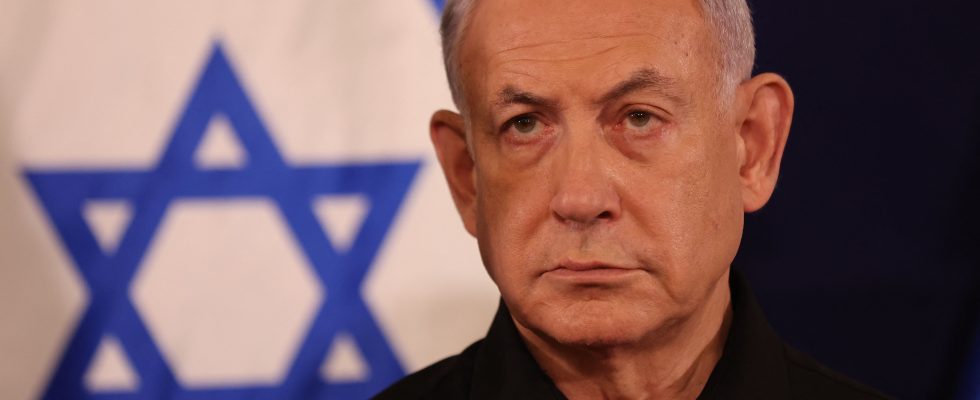Impossible to escape it. Displayed on thousands of billboards across the country and widely distributed on the Web, the accusatory slogan “You are the leader, you are guilty” is aimed at Benyamin Netanyahu, designated as the main person responsible for the security fiasco of October 7. Financed by the vast opposition movement to the Israeli Prime Minister, this new campaign denounces the latter’s inability to anticipate the Hamas attack and to protect its population. It did not take long to find relays among the Saturday evening demonstrators and in the political class.
“We are asking for early elections not only because of past failures, but also because of present failures. After five months of war, no solution is emerging,” thunders Yaïr Golan, hero of October 7 who tries to embody an alternative left against Netanyahu. A high-ranking officer in the Israeli army, this former deputy from the far-left Meretz party plays on the glorious past of the Labor military and on the involvement of left-wing Israelis in the IDF.
The Israeli Prime Minister also faces repeated attacks from the American president. Supporter from the start, Joe Biden has multiplied incendiary outings in recent weeks, off-camera or in front of the camera. “He is doing more harm than good to his country,” he said recently, denouncing the suffering inflicted on the civilian population in Gaza. Driving the point home, an American intelligence report made public on March 11 states that the position of the Israeli Prime Minister finds itself weakened after American pressure and the risk of a humanitarian crisis in the Gaza Strip. “Distrust in his ability to govern has increased from its already high pre-war level, and we expect large protests demanding his resignation and new elections,” it says. Thursday March 14, it was the leader of the Democrats in the US Senate who called on him to resign.
The policy before October 7 is difficult to justify
On the defensive both internationally and internally, Netanyahu plays it straight. With each public intervention, he reaffirms his determination to continue the war with the same intensity, without taking into account diplomatic pressure. “My decisions are supported by the majority of Israelis,” he said shortly after Joe Biden’s charge. In fact, all polls show massive support for the war he is leading at the head of a national unity cabinet including his main rival, the centrist Benny Gantz. 58% of Israelis want the IDF to launch an offensive in Rafah, and 63% say they are opposed to holding early elections in the middle of a war. In the same movement, a large majority of public opinion rejects an agreement at all costs with Hamas and supports Netanyahu’s firmness in negotiations with the armed group for the release of hostages in exchange for a truce and enlargement. hundreds of Palestinian prisoners.
Supported in the war against Hamas, Netanyahu nevertheless recorded a serious erosion of his electoral base. Most opinion studies place him far behind Gantz if elected. With his far-right allies suffering the same erosion, he would be unable to form a coalition. “The discontent should increase as soon as the war is over. I feel immense anger among the people. Like that which struck Golda Meir after the Yom Kippur War in 1973,” predicts Michael Milshtein, lecturer at Tel Aviv University. Scrutinized by a commission of inquiry after the conflict against Egypt, the Israeli Prime Minister had to leave political life.
Even before the end of hostilities in Gaza, charges are piling up against Benyamin Netanyahu. If the inability to detect the intentions of Hamas necessarily involves the co-responsibility of intelligence and the IDF general staff, the Prime Minister will have to justify alone his policy of appeasement, since his return to power at the end of the 2000s. With each Hamas attack, it systematically calmed things down and refused a significant ground operation. After the great clash of summer 2014, he established a de facto armistice with Hamas. Then begins the waltz of suitcases of notes sent by Qatar to keep the Gazan economy afloat and gentrify Hamas executives. Warned by his services that a good part of these funds are used to build offensive tunnels and buy weapons, Netanyahu rejects the scandals and promises “years of calm”. Until the end, he continued to believe in his concept of “economic peace”. A few days after October 7, he prepared to reach an unofficial agreement with Hamas to allow the entry of tens of thousands of Gaza workers into Israel.
.
